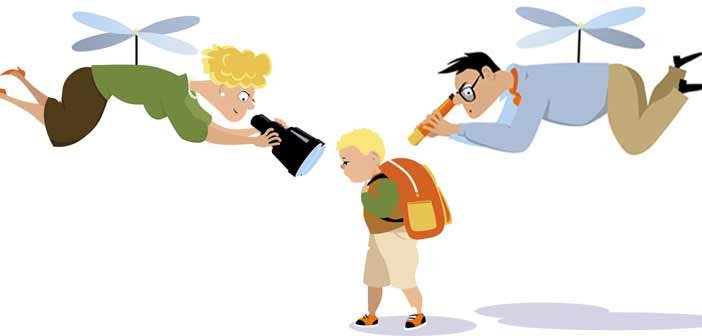
Helicopter Parenting
The dictionary states the meaning of the word helicopter as a machine /aircraft without wings, that has one or two large sets of blades that go round very fast on top.
And if you add the word parenting to the word helicopter, it means “constantly hovering over your child and taking decisions for them at a very rapid rate!”
In simple words, helicopter parents are parents who constantly hover over the heads of their children, making sure:
1. They don’t trip
2. They don’t rip their clothes
3. They don’t get their clothes dirty
4. They don’t climb the solitary guava tree in the neighbourhood
5. They don’t eat the occasional chocolate that fell on the floor
6. They don’t colour outside the lines
7. And always use a sanitizer before eating a snack!
Many would argue and say that this is exactly what an ideal parent should be.
Absolutely agree with that and let me clarify the difference between helicopter parenting and good/ alert/ responsible parenting.
Let’s just say that no matter how much attention you pay to your child’s hygiene, your child will catch some infection someday.
No matter how careful you are, your child will trip and graze his /her knees one day and no matter how particular you are, your child will probably try to wipe his/her wet hands on his/her clothes one day!
And that is absolutely fine. Your child needs to make mistakes, get messy and take chances. That does not make you a lesser parent. The lessons that your child will learn by falling off a bicycle or rolling in mud to fetch a ball that went off the boundary during a match, are real lessons.
By rushing in each time your child stumbles, complains or falters, by not allowing them to mess around a bit, by not facilitating them to take their own decisions and accept responsibility for their actions, you are actually robbing them of the opportunity of learning essential life skills.
There is a very thin line between getting involved as a parent and being able to draw a line. It’s wonderful to be involved in your child’s life but it is equally important to let them take the occasional tumble and make their own decisions at times.
It is often out of concern or rather fear for the child’s safety that we, as parents, tend to “hover” around our children. No parent can be blamed for that as it is a dominant instinct amongst all parents. However, here are some questions that each parent could ask himself/herself before getting into the ‘helicopter mode and swinging into action’
1. Is my child in physical danger?
No parent wants to see their child run into danger. And by danger I mean crossing the road unaccompanied or walking unchaperoned on a busy street. Falling down is “NOT” danger. If your child is facing an imminent physical threat, do get into action and after pulling them into the safety zone, counsel them of the imminent physical harm they could have got into. At the same time, if your child falls off a tricycle, do not lock the tricycle away in the garage. Children need to scrape a few knees and get a few bruises to learn how to steer clear of such trouble. They need to learn to draw their own lines at times.
2. Is your child posing a physical threat to others around?
If it is a normal scuffle between friends in the course of play, do not rush in to settle matters. Rather, pause and observe. Most such battles are borne away within seconds. But if you see the battle taking an ugly shape in the manner of fisticuffs, do hover in and instead of taking sides, encourage them to settle disputes by themselves.
3. If the play turns messy, if the paint splashes on clothes and mud splatters on shoes and socks and there is water spilt around – ask yourself, ‘is it causing any harm?’ If it is only leading to fun and camaraderie, giggles and happy laughter, join in the gang and be a kid all over again. Rein in the chopper pilot and believe me, the only thing it can lead to is some extra cleaning and laundry chore. But the feeling of happiness and joy will linger much after your laundry is done!
4. If your child skips a routine, colours outside the lines and wears shorts to bed instead of pyjamas – ask yourself, ‘does it matter and is it wrong ?’ If it really does not matter and it is not really wrong, it’s okay to relax and allow the child to colour the brinjal back and the sky green. That does not mean that you do not teach them that the brinjal is purple and the sky is generally blue. It means that you allow room for creativity and decision making. Let your child explain to you why they coloured the sky green. Allow room for their opinion instead of thrusting yours each time.
Life is all about falling and learning.
Be a responsible parent at all times but hovering around only leads to your child leaning back to you for decisions all the time. Each time they get into trouble, they will wait for you to bail them out.
Instead, teach them to gradually take their own decisions and accept responsibility for the same.
